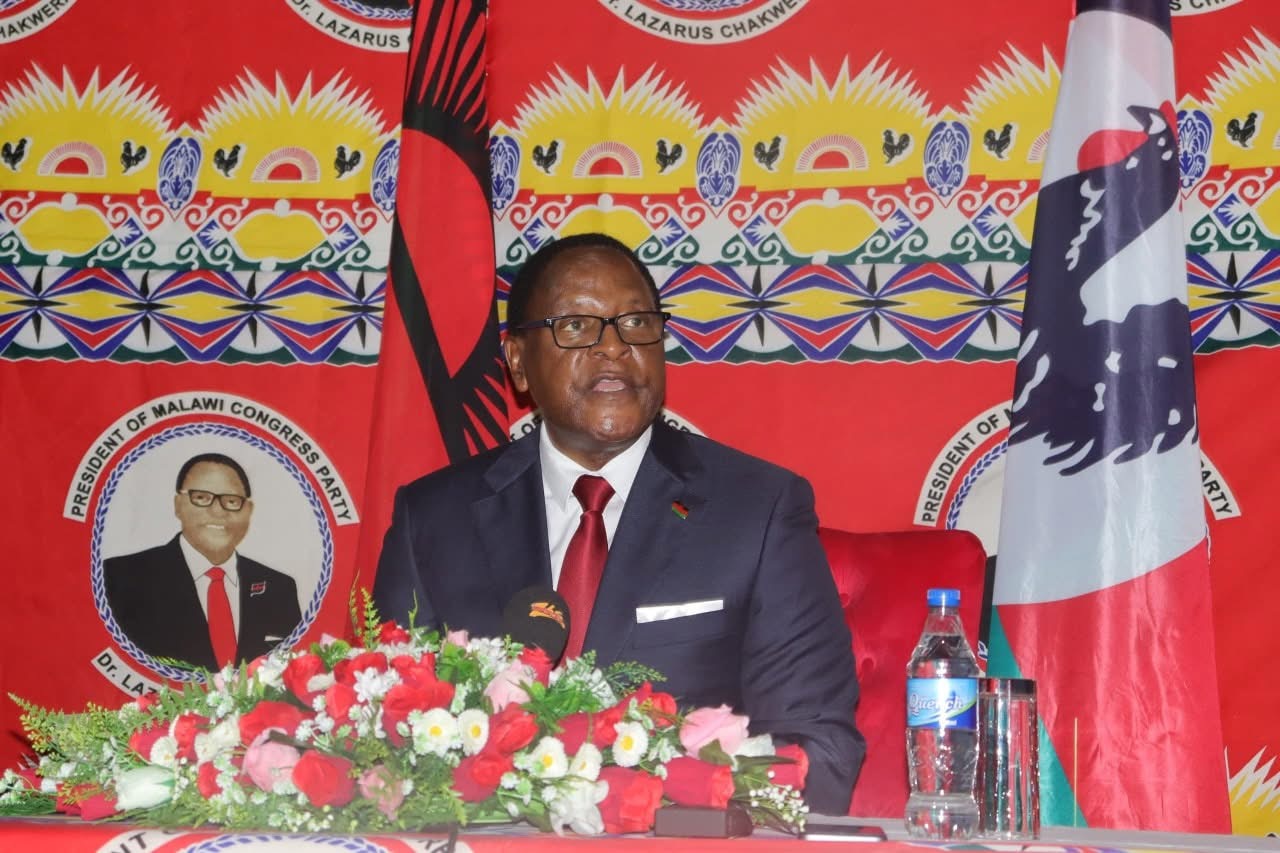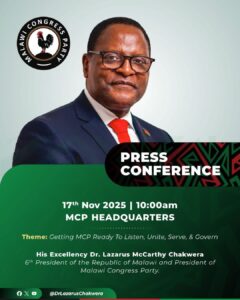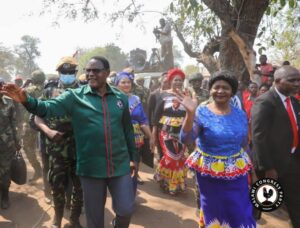
Chakwera address the media at MCP headquarters in Lilongwe
* The briefing felt less like an act of leadership and more like a poorly timed attempt to control a narrative that no longer belongs to him
* Coming at a time when Malawians are grappling with economic pressures, governance anxieties, and growing expectations from the MCP’s post-election aftermath
* Rather than reassuring the nation, the press conference appeared defensive, reactive, and misaligned with Malawi’s current political mood
By Duncan Mlanjira
Former President Lazarus Chakwera made his first public appearance since leaving office after the September 16 general election by hosting a press conference at Malawi Congress Party (MCP) headquarters in Lilongwe, which Don Consultancy Group (DCG), Chief Economist Chifipa Mhango describes as “unnecessary [and], by all objective measures, a political misstep that added little value to the national discourse and raised more questions than answers.

Mhango says he was looking forward to listening to the former President’s press conference, “but left disappointed with its content” and goes on to offer what a statesman would have done instead.
He says: “Coming at a time when Malawians are grappling with economic pressures, governance anxieties, and growing expectations from the MCP’s post-election aftermath, the briefing felt less like an act of leadership and more like a poorly timed attempt to control a narrative that no longer belongs to him.
“Rather than reassuring the nation, the press conference appeared defensive, reactive, and misaligned with Malawi’s current political mood.”

Chief Economist Chifipa Mhango
A Missed Opportunity for Statesmanship
Thus Mhango observes that this was a missed opportunity for statesmanship, saying: “Chakwera’s remarks were expected to give clarity, closure, or direction. Instead, the content largely revisited old themes, justified past decisions, and subtly deflected responsibility.
“For many Malawians, this came across as a leader struggling to move from office-holder to elder statesman. A statesman speaks when the country needs him — not when he feels the urge to defend himself.
“What today’s press conference demonstrated is that timing matters, tone matters, and above everything, purpose matters.”
Mhango explains why the press conference was unnecessary, that it “offered no substantive updates, no new revelations, and no solutions to current national concerns — without fresh content, the entire exercise risked appearing self-serving and unnecessary”.

Advertisement
Wrong Timing
He described it as wrong timing, saying: “With Malawi currently focused on economic stability, governance reforms, and post-election political restructuring, citizens are seeking direction from the incumbent administration — not a retrospective commentary from the former president. Chakwera’s timing only amplified public fatigue.”
Defensive Communication
“Rather than projecting maturity and calm, the tone was largely defensive. This often happens when leaders communicate reactively rather than strategically, and it rarely achieves the desired effect.”
Undermined His Own Legacy
Mhango also highlights that “as Malawi’s former Head of State, Chakwera’s legacy is still being shaped” adding that “unnecessary engagements risk overshadowing positive contributions and giving critics more ammunition”.
What Would Have Been the Better Approach?
1. Issue a Short, Written Statement: A carefully-worded, dignified written statement would have served him better than a live conference. Written communication reduces missteps, controls tone, and avoids the optics of defensiveness.
2. Focus on National Unity, Not Self-Justification: Malawi needs elder statesmen who lift the national tone. A message of unity, support for democratic institutions, and encouragement of national reforms would have repositioned him as a patriot above politics.
3. Allow the Current Administration to Lead: Statesmanship requires knowing when to step back. By refraining from public commentary unless absolutely necessary, Chakwera could have strengthened perceptions of maturity and respect for institutional continuity.
4. Engage Through Thought Leadership, Not Reactionary Pressers: If the former President wanted to contribute, he could have:
* Published an article on governance lessons; given a lecture at a university; spoken on policy, not politics; released reflections on Malawi’s democratic future; among others. These platforms add intellectual value without creating controversy.
5. Protect His Political Capital: Every public appearance expends political capital. A wiser approach would have been selective silence — speaking only when his voice is necessary for national stability or crisis mediation.

A Statesman’s Path Forward
“Whether intentionally or not, today’s press conference has reminded the former President — and all who hold public office — that leadership does not end when one exits the State House — it evolves.
“Chakwera still has an opportunity to reposition himself as a respected democratic elder, but that requires disciplined communication, strategic restraint, and a commitment to elevating national dialogue rather than revisiting personal political battles.
“Malawi needs leaders who inspire confidence, not confusion. Today’s press conference failed to meet that moment — but it can still serve as a lesson for better leadership engagement going forward, especially with good and open advisors around him.
“Otherwise, it’s just a continuation of where he left from, while in Government. It looks like the healing will take longer, and a democratic right has been misplaced,” maintains the Chief Economist, who is also DCG’s Director of Economic Research & Strategy.



Advertisement
